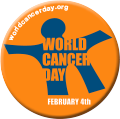 Today is World Cancer Day. Held each year on 4 February, this is an initiative of the Union for International Cancer Control (UICC), a leading international non-governmental organisation that unites the cancer community to reduce the global cancer burden. Yesterday we started looking at how psychological intervention can help to “Debunk the
Today is World Cancer Day. Held each year on 4 February, this is an initiative of the Union for International Cancer Control (UICC), a leading international non-governmental organisation that unites the cancer community to reduce the global cancer burden. Yesterday we started looking at how psychological intervention can help to “Debunk the
myths” with particular focus on: Myth 01 “We don’t need to talk about cancer”. Today, Psychologist, Catherine Waight, guides us through the cancer support available during the Diagnosis and Treatment stages of the disease. Catherine has a special interest in health psychology and has personally been touched by the impact of the disease.
Cancer Support during Diagnosis and Treatment
Adjustment to any disease diagnosis can be tough. Psychologists can help you and your family in this initial phase of the cancer illness cope with 4 common areas of distress including: Emotional distress, practical impacts, physical and sexual consequences, interpersonal and social relationships.
1. Emotional Distress
- Shock and confusion: adjusting to an ‘illness identity’. It is common for people to compare themselves to ‘before’ and ‘after’ the diagnosis
- Fear, insecurity and uncertainty regarding their future
- Loss: of health, independence, control of life, plans they may have had for their future
- Anger, resentment, guilt: common when people blame the cancer diagnosis on their own behaviours (e.g. a chronic smoker who has recently been diagnosed with lung cancer).
2. Practical Impact
- Financial burden: loss of income, relocation costs, treatment costs
- Coping with frustrations related to potential barriers obtaining insurance, health care, etc.
3. Physical and Sexual Effects
- Self-esteem and body confidence issues related to possible disfiguration after surgery (e.g. mastectomy (removal of the affected breast), orchiectomy (removal of the affected testicle)
- Sexual dysfunction
- Physical and emotional consequences to treatment (e.g. chemotherapy and radiation)
- Pain and other physical and mobility consequences after treatment and/or surgery
- Fertility: can be equally distressing for both men and women who may have to come to terms with loss of choice, grief and loss.
4. Interpersonal and Social Relationships
- ‘Feeling left out’: reduced ability to participate and engage in social activities and employment due to the effects of treatment
- Role changes in the family: changes in domestic responsibilities and loss of ‘bread winner’ abilities
- Separation during treatment (especially for families who live in rural areas of Australia)
- Communication breakdown: for example- From the person with cancer perspective: ‘I don’t want to burden my family so I will struggle with this illness on my own’. This is a common thought which often drives a wedge in relationships. From the family/friends perspective: Feelings of ‘protectiveness’ , which may be from the heart, often leave the person with cancer feeling ‘cornered’, smothered and frustrated at the loss of their independence
- For the carer and family/friends it is common to report similar levels of distress as their loved one with cancer due to the disruption in family life.
As can be seen from above, the adjustment and challenges during the Diagnosis and Treatment Stages of cancer is many and often complex. Coupled with the effects of the physical consequences of the disease itself as well as the treatment process, the cancer patient and his/her family is faced with a very difficult journey. It is so important to offer as much support as possible but in ways that matter for the patient and the family. Ask the question, “how can I help?”, “what can I do?” and lets start talking about cancer.
For more information on World Cancer Day, please visit www.worldcancerday.org.
Have you or someone you know been diagnosed with cancer?
If you or a loved one has recently been diagnosed with cancer and you would like help in coping with this, please contact the Psych Professionals.
We offer a range of counselling and therapy services.
Please also feel free to contact Psychologist, Catherine Waight, at Email: catherine@psychprofessionals.com.au.
